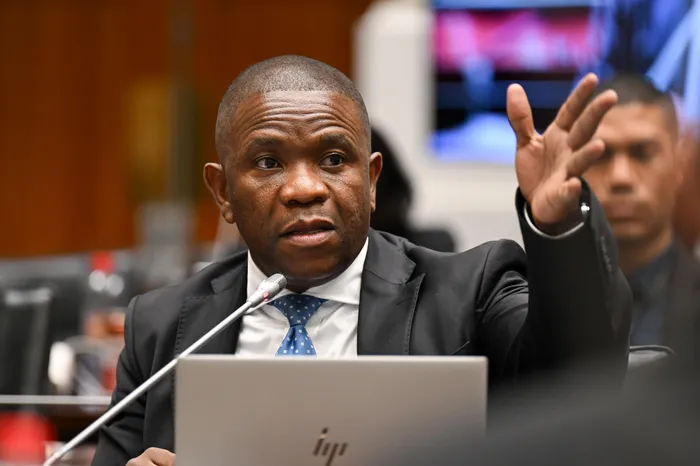
KZN police commissioner Nhlanhla Mkhwanazi during his testimony before the ad hoc committee.
Image: Henk Kruger / Independent Newspapers
KZN Police Commissioner Nhlanhla Mkhwanazi believes suspended Police Minister Senzo Mchunu was only the signatory of the letter that controversially confirmed the dismantling of the political killings task team (PKTT).
Mkhwanazi has accused rogue political forces of sabotaging the fight against political killings and claimed Mchunu wasn’t even the real author of the letter that disbanded the elite task team investigating them.
“I don’t believe Minister Mchunu wrote that letter. Someone made him sign it. If the minister was honest, he would say someone made me sign this, I did not write it myself… if he comes here and says it’s him then there will be trouble,” Mkhwanazi told MPs of Parliament’s ad-hoc committee probing corruption in the criminal justice system.
The letter signed by Mchunu, dated December 2024, was directed to the National Commissioner Fannie Masemola, to disband the PKTT. According to Mchunu’s letter, the PKTT had “no value” but investigations revealed that this move was to protect criminals.
Mkhwanazi said there was no consultation, no briefing, and no logic behind the decision — only backroom and political manipulation.
He maintained that the letter was drafted elsewhere, adding that it was not true that they were briefed.
He pointed to Mchunu’s chief of staff, Cedrick Nkabinde, as a possible go-between: “Nkabinde told me the letter was going back and forth. That told me it was being crafted by others — not the minister himself.”
Mkhwanazi and Masemola believe it was to protect politically connected murder suspect Vusimuzi “Cat” Matlala — arrested just before the PKTT was scrapped. Matlala is allegedly linked to senior police officer General Shadrack Sibiya and Brown Mogotsi, both with reported ties to Mchunu.
Mkhwanazi also told MPs of junior officers colluding directly with politicians to influence police leadership.
“You will have a Sibiya sending a WhatsApp message to the deputy minister. I don't know who the deputy minister is,” he said.
The commissioner added that he was still investigating the matter.
The PKTT was formed to crack down on politically motivated assassinations in KZN — a province long plagued by corruption and bloodshed. Its sudden collapse has now become a symbol of deep rot within the state. Some of the key dockets it was investigating have been recently returned, having allegedly been kept in Sibiya’s office in Pretoria.
Mkhwanazi also provided more explosive allegations citing WhatsApp messages linked to the disbandment of the PKTT and that these were now under criminal investigation. He warned MPs that public disclosures of classified material had compromised operational safety.
DA MP Dianne Kohler Barnard attended the session virtually after the provincial commissioner accused her of disclosing classified intelligence information at both the parliamentary inquiry and the Madlanga Commission, an allegation she has denied.
The DA said it had sought legal advice on any recusal request.
But it was in response to questions from EFF leader Julius Malema that Mkhwanazi delivered another bombshell, calling on parliament to probe how former IPID boss former Independent Police Investigative Directorate (PID) head Robert McBride interacted with forensic investigator Paul O’Sullivan, the meeting venues, cellphone locations, where they met and the way they engaged in terms of investigations.
He said he was told by Nkabinde that operations of IPID were planned, coordinated and executed at O’Sullivan’s house.
“I am to require such be investigated in detail because the phone will put McBride, in this place, put Paul O’Sullivan in this place, Nkabinde in this place and others. When that investigation is concluded nobody can deny it because we will know exactly all of them were operating, guided by Paul O’Sullivan.”
Mkhwanazi told Malema he was interested to know the author of a report that was produced wherein the City of Johannesburg and the National Commissioner wrote to the State Security Agency asking about the legality or otherwise of a gadget bought by the Metro when Sibiya was in charge of security there.
He said he was interested to know how the gadget was sourced from the UK.
Another investigation should be conducted on a similar gadget that was bought by the Directorate of Priority Crime Investigation (DPCI) in 2010, when Sibiya was working at the DPCI.
Mkhwanazi said the investigation should look at whether it was bought legally and who the supplier and manufacturer was.
“I would want Parliament to check every financial record of Paul O’Sullivan and all individuals mentioned so that we draw the conclusion of whether Paul O’Sullivan is a conman or is an agent.
“Based on the investigation we will be able to conclude whether he is indeed a clean man or he is what is said in public, an agent,” Mkhwanazi said in response to Malema's question on whether O’Sullivan is an MI6 (the UK's foreign intelligence agency) agent.
He warned that if the government fails to act “the men and women in this country” are going to take it upon themselves to do something drastic about this.
“It may not be what this government wants because he has gone too deep, to show he has control all over.”
Cape Times
Related Topics: